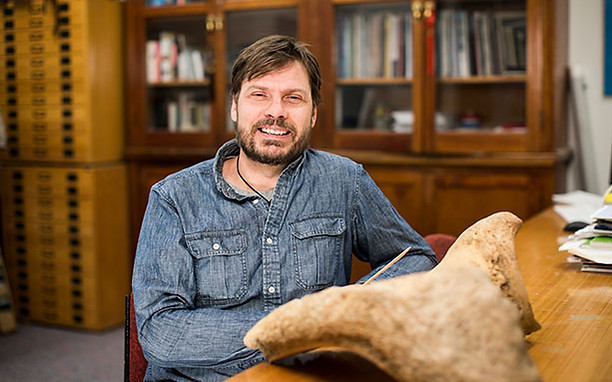2016 Winners
South Australian Scientist of the Year
Professor Alan Cooper
Australian Centre for Ancient DNA, University of Adelaide.

Professor Alan Cooper has built the Australian Centre for Ancient DNA (ACAD) into an internationally leading research centre studying issues ranging from Aboriginal genetic heritage to the impacts of environmental change and the evolution of human diseases. He has led many large international multi-disciplinary studies and created major new research areas, including the first genome of an extinct species, and reconstructing the genomic history of Europe. An ARC Laureate Fellow, his work regularly features in the highest profile journals and global media. By creating detailed pictures of climate change, human history, and disease his work will be critical to Australia’s future.
PhD Research Excellence
Dr Phiala Shanahan
University of Adelaide

Dr. Phiala Shanahan, a theoretical particle physicist, studies the structure of particles like the proton and neutron – the basic building blocks of the known universe. Dr. Shanahan graduated from the University of Adelaide with a degree in High Performance Computational Physics in 2011 with first class honors and the Alumni University Medal. In 2015 she completed her PhD in theoretical nuclear and particle physics at the University of Adelaide, receiving the Alumni Postgraduate University Medal. In September 2015, Dr. Shanahan took up a postdoctoral position in the Centre for Theoretical Physics at the Massachusetts Institute of Technology in Boston, USA.
Early Career STEM Educator of the Year – School Teaching
Ms Charlene McGrath
Aberfoyle Hub R-7 School

Charlene McGrath currently works as classroom teacher and is working on science goals at Aberfoyle Hub R-7 School (AHS) to raise the profile of science within the school community. Sharlene has created a science blog, enabling senior students to work as reporters to inform the community about science at the school. She has also organised National Science Week events and is now coordinating a Science Fair for the school.
Early Career STEM Educator of the Year – Tertiary Teaching
Dr Lyndsey Collins-Praino
School of Medicine, The University of Adelaide

Dr Lyndsey Collins-Praino obtained a PhD in behavioural neuroscience from the University of Connecticut. After completing a postdoctoral fellowship in cognitive neuroscience at Columbia University, she joined the University of Adelaide School of Medicine in 2014, where her research focuses on understanding the brain basis of cognitive decline in neurodegenerative diseases. In addition to research, Lyndsey also has a strong commitment to teaching. She coordinates multiple neuroscience courses, is Year 1 co-convenor for the MBBS program and Neuroscience Co-Convenor for the Bachelor of Health Sciences. In 2015, she was recognised with the Executive Dean’s Award for Excellence in Teaching
Excellence in Research Collaboration
Dr Michelle Wirthensohn
University of Adelaide

Dr Michelle Wirthensohn is the Program Leader of the Australian Almond Breeding Program which is funded through Horticulture Innovation Australia. She is a member of the Almond Board of Australia’s Plant Improvement Committee and lectures in Plant Breeding at the Waite Campus. Her areas of research interest include varietal improvement, biochemistry of almond kernel flavour, genetic mapping of important agronomic traits of almond, and water use efficiency of almonds.
Tall Poppy of the Year
Dr Justin Chalker
Flinders University

Dr Chalker’s research uses innovative chemistry to solve grand challenges in sustainability, biochemistry and medicine. This includes new diagnostic tools that detect biomarkers for disease, for example: cancer, biodegradable wound dressings to help burns victims and the design of useful materials that protect the environment.
Dr Chalker’s goal is to demonstrate how science is fascinating and essential to solving global problems. He is currently in collaboration with artists at MONA in Hobart, where he is working to merge art and science to promote environmental awareness.